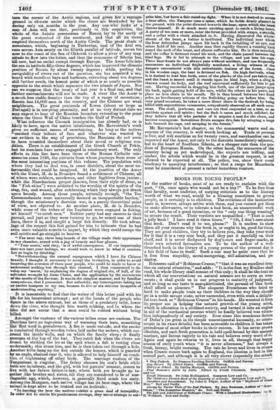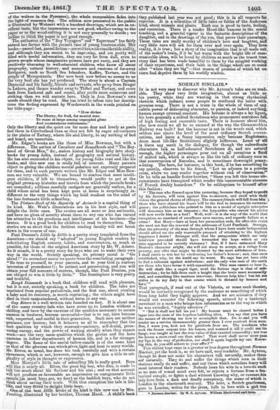BOOKS FOR YOUNG PEOPLE.*
Ix the matter of books, most of us are ready to exclaim with the poet, "Oh, once again who would not be a boy !" To be free from that faculty, most undivine, of carping criticism as to the literary worth of what we read, would be a blessing sometimes to grown people, as it certainly is to children. The criticism of the instinctive taste is, however, always active with them, and you cannot get them to make allowances, or to tolerate a bad book, an unsuccessful work of art, because of a good intention, or the "only one thing wanting' to secure the result. Their verdicts are unqualified "That is such a jolly book! I have read it three times." "Oh, I don't care about that book. Don't read it to me, please!" It is useless to show them all your reasons why the book is, or ought to be, good for them. They are good children, they try to believe you, they take your word for it that it is a very nice book, and they put it carefully on their shelf, and it is never disfigured by dog's-ears and finger-marks, as their own selected favourites are. To be the author of a well- thumbed book in the library of a young person of the present day is a fair field of fame in itself. Such a one may be quite sure that he is free from stupidity, moral-mongering, self-admiration, and pe- dantry.
Rousseau said of" Robinson Crusoe," "that it was an excellent trea- tise on natural education," and adds : "It is the first my Emilius shall read, his whole library shall consist of this only; it shall be the text on which all our conversations on natural science are to serve as com- ments; it shall guide us in our progress to maturity of judgment, and so long as our taste is unsophisticated, the perusal of this book shall afford us pleasure." The eloquent Frenchman who tried so hard to make people train up their children in the way they should o in a noble savage state, never succeeded, even with such a delight- ful as "Robinson Crusoe" in his hands. Ile wrested it from its proper use in helping the natural growth of the young mind, winch is education in a civilized society, and turned it into an engine in aid of the mechanical process which he fondly believed was eduea. - tion independently of any society. Ever since this wondrous fiction of Defoe's (so great in its simple unsentimental humanity, so micro- scopic in its exact details) has been accessible to children. it has taken precedence of most other books in their esteem. It has never grown olisolete, and each fresh generation is held spell-bound by this ancient mariner, and listens eagerly to his tale and believes every word of its Again and again he returns to it, lives in all, through that happy season of early youth when "it is never afternoon," but always a fresh, breezy, bright morning. The tale he loves and lives in ceases when Crusoe comes back again to England, the illusion is lost in the second part, and although it is all very clever (especially the attack
* nay Tadpok. By Frances Freeling Broderip. Griffith and Ferran.
Guy Rivers. By .Alfred Elwes. Griftlth and Ferran.
Harry at School. By Emilia Marryat Griffith and Ferran. Paul Duncan's Little by Little. Edited by Frank Freeman. Sampson Low and Co.
Rough Diamonds. By John Efollingshed. Sampson Low and Co.
The Children's Picture-Book of the Sagacity of Animals. Sampson Low and Co.
Cavaliers end Roundheads. By John G. Edgar, Author of the " Boyhood of Great Men." Bell and Daldy. Among the Tartar Tents of the Lost Fathers. By Ann Bowman, Author of ranza," " The kangaroo Hunters," dm. Bell and Daddy. The Life and Adventures of Robinson Crusoe. With a hundred illustrations. '
H. Wehnert. Bell and Daldy.
of the wolves in the Pyrenees), the whole composition fades into the light of common day. The edition now presented to the public is illustrated by Wehnert with a hundred drawings, which are in ex- cellent taste, but the impressions are not good, whether owing to the paper or to the wood-cutting it is not easy generally to decide; we iodine to think the paper is not good enough. The authoress of the "Boy Voyagers" and " Esperanza" has fairly
earned her favour with the present race of young tourteen-olds. Her books—pare el fact, parcel fiction—are writ ten with considerable ability., and although they are meant to be impruviug, and are pretty well filled with useful information, they are very far from dull, even to grown people whose imaginative powers have got rusty, and they are positively charming to well-educated children who know all about geography, natural history, and manners and customs of far-away foreigners, such as South Sea Islanders, ICaffirs, Tartars, and the
people of Mesopotamia. Her new book now before us seems to us the very best she has yet produced. The story is about a Captain Desmond and his family, friends and servants, who go up from Bengal to Lahore, and thence wander away to Thibet and Tartar3r, and come back from Yarkund safe and sound, after perils more numerous and striking than we will narrate here. Only in Ann Bowman's own words should they be read. She has tried to infuse into her descrip- tions the feeling expressed by Wordsworth in the words printed on her title-page :
"How divine The liberty, for frail, for mortal man To ream at large among unpeopled glens
And mountainous retirements."
Only the liberty and the quiet are far more dear and lovely as poets feel them in Cumberland than as they are felt by eager adventurers in the plains of Tartary, where life and liberty, to say nothing of bed and board, are uncertain.
Mr. Edgar's books are like those of Miss Bowman, but with a difference. The author of Cavaliers and Roundheads and "The Boy- hood of Great Men," &c., makes history and biography into story- books for young folks, instead of geography and natural history. He has also succeeded in his object, for young folks read and like his books, and this new one is really full of interest. Many parents object to giving the children mental pabulum not expressly prepared for them, and to such parents writers like Mr. Edgar and 'Miss Bow- man are very valuable. We are bound to confess that most intelli- gent children, if left to themselves, would prefer to get at the original grown-up histories and travels from which the juvenile books are compiled ; editions carefully castigate are generally useless, for a child whose mind has been kept pure at home is surprisingly in- different to the very things which lay hold readiest on the nund of the less fortunate little schoolboy. The .Picture-Book of tke Sagacity of Animals is a capital thing of its kind. Mr. Weir's illustrations are in his best style, and will delight the little ones. The stories are all more or less authentic, and have no gloss of novelty about them to any one who has turned his attention to the goodness and intelligence of his brothers—the brutes. It is a good book for children to read to themselves. The stories are so short that the feeblest reading faculty will not break down in the course of one.
Paul Duncan's Little by Little is a pretty story translated from the American-7w should say "adapted" to young English readers by substituting English scenery, habits, and conversation, as much as possible, for those of the original American story by Mr. W. Adams. As it stands, it is a pretty story for boys who are to make their own way in the world. Strictly speaking, its primary moral is "Go ahead !" its secondary moral we quote from the concluding paragraph : "Be true to yourself, to your parents, and to your God (a curious inversion of precedence !) ; be patient and persevering, and you will obtain your &II measure of success, though, like Paul Duncan, you are obliged to win it little by little." The frontispiece is very pretty and truthful.
Rough Diamond., is a book that children will read with pleasure, but it is not, strictly speaking, a book for children. The tales are reprinted from popular periodicals, and the first one, about stealing a baby and its recovery, is worth reprinting ; the others might have died in their magazinehood, without harm to any one. Guy Rivers is a well written tale founded on fact. It is about one of the many country lads who have come up to London without a shilling, ma have by the exercise of the qualities necessary to secure success in business, become successful—that is to say, have become rich, respected, and useful in their generation. Such men are neither geniuses, nor heroes; but it behoves us all to remember that the best qualities by which they succeed—patience, self-denial, perse- vering energy, and the power of waiting steadily when they cannot work—are the very same qualities which the genius and the hero exercise in loftier departments of human life, and in a far stronger degree. The flame of the useful tallow-candle is of the same kind as that of the glorious sun which gives light and heat to many worlds. Mr. Elwes, as usual, has done his task carefully and with a certain cleverness, which is not, however, enough to give him a title to ori- ginality of style in thought or expression.
Miss Marryat's little tale of schoolboy life is really good. Boys will like it nearly all. Elton, the good big boy, who dies, is made to talk too much about his Saviour and his sins ; and on that account will not produce so favourable an impression on unregenerate little rascals (as most boys are, we fear) as the baddish boys, who do not think about saving their souls. With that exception the tale is life- like, and very fitted to delight little boys. One of the best little books of its kind is this new one by Mrs. Freeling, illustrated by her brother, Thomas Hood. A child's book they published last year was not good ; this is in all respects far superior. It is a collection of little tales or fables of the Andersen kind, about animals and plants. Each one is good in taste, feeling, and execution. There is a tender Hood-like humour in the moral teaching, and a graceful vigour in the fantastic descriptions of the daughter, and in the drawings of the son, that prove their parentage. These tales are really worthy of children's love and laughter, and very little ones will ask for them over and over again. They love reality, it is true; but a story of the imagination that is all made out. of the maker's brain, if it be but warm with the bright life of com- municable ideas, will be loved by children as much as the tritest true story that has been made beautiful to them by the mingled working of their experience, and their faith in the things which are to coma after "when they are big"—that season of promise of which let no stern fool deprive them by his worldly wisdom.































 Previous page
Previous page